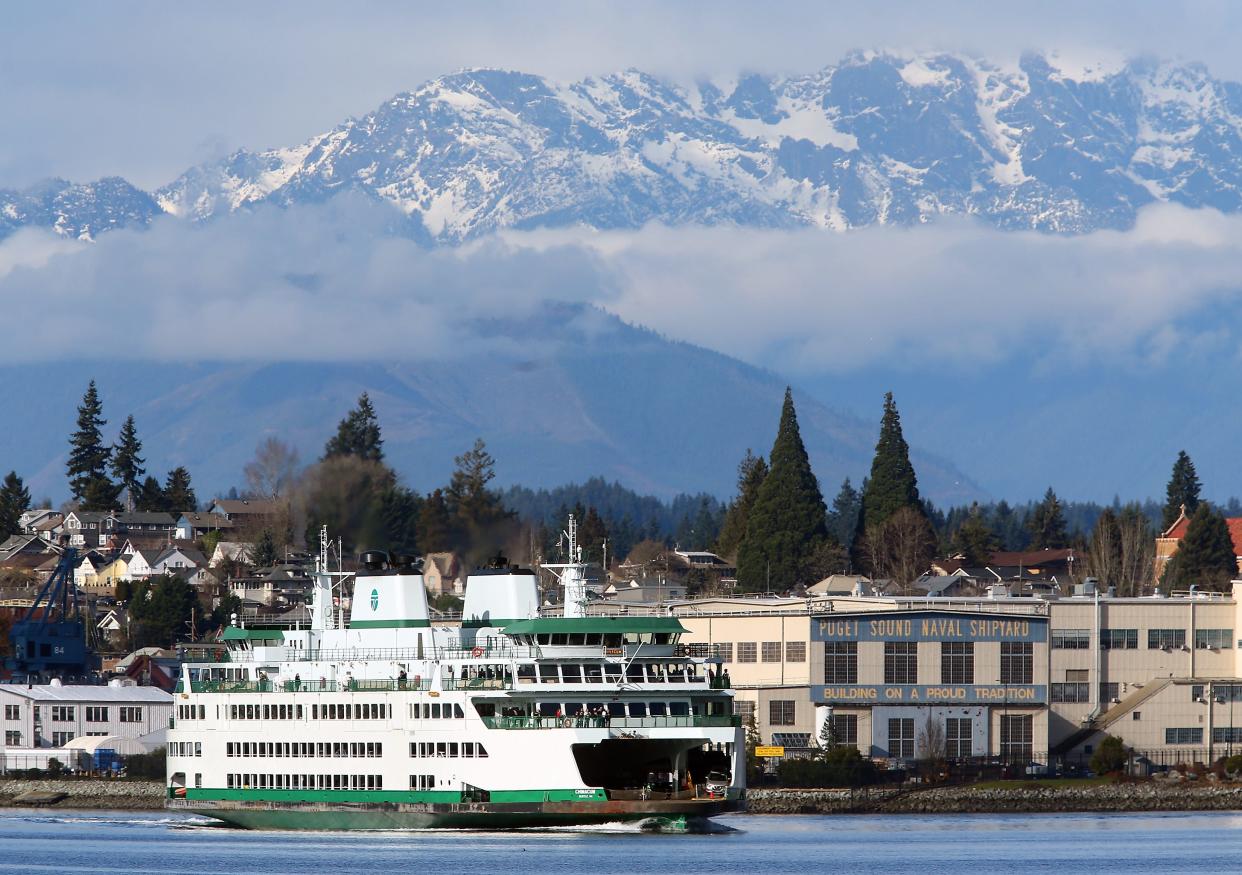Commuters and impact at center of plan to rally state's focus around ferries

Note to readers: This story has been updated. The bill reported in the initial version of this story was re-filed as HB 2497 on February 10. Among other changes, the scaled-down version has identified The Evergreen State College to conduct its study.
Greg Nance has a lifelong connection with the ferry system. He was three months old on his first ferry ride when the family moved to a new home on Bainbridge Island, and it was on a ferry where he saw his first orca whale and first bald eagle.
Nance, a Bainbridge Island resident, is serving as the 23rd District Representative after his appointment by the Kitsap County commissioners in September, and he’s riding the wave to one of his first major causes in Olympia. The integrity of the Washington State ferry system has been a top priority for Nance from the start, and one month into his freshman legislative session he’s championing a bill to create a commission to study impacts of the ferry system’s shortcomings, secure federal funding, champion transparency and build vessels and workforce.
“For me, the ferries have always represented connection and togetherness and it also represents opportunity,” Nance said.

Kitsap commuters have witnessed route delays or a one-off vessel that’s run aground, crashed into a terminal, or suffered a log strike, but the more frequent inconvenience is cancellations. Washington State Ferries reported 99% reliability this January, and 96.8% in January 2023, but that’s still 121 sailing cancellations this month and 396 in January 2023, reported WSF spokesman Ian Sterling. The Bremerton-Seattle route hasn’t been in full service since 2021 either, operating without a second vessel.
The WSF fleet currently has 21 vessels traversing the Puget Sound, with many “approaching the end of their lifespan, some having surpassed their 60th year,” Sterling said. The WSF Service Contingency Plan reports that a fleet of 26 vessels are “necessary to provide reliable service on every route,” and though WSF has enough funding for five more ferries that can be built out of state, it could be years before those boats come to the rescue.
“We've underinvested for 25 years and now we're really at a breaking point where we've got to come together to fix our ferries,” Nance said.
A running start toward funding
Nance’s House Bill 2497 isn’t a silver bullet, but “silver buckshot,” he wrote in the Kitsap Sun in December. Nance’s bill will have three core policies: Investing in new vessels with lower fuel costs; rebuilding the ferry workforce; and fostering transparent, accountable leadership.
The bill would create what he's coined the Washington State Ferries 75 work group – an homage to WSF’s upcoming 75th anniversary. The work group would be tasked with evaluating the financial needs of the ferry system and identify opportunities for state and federal funding.
One of the work group’s pivotal responsibilities however, will be to conduct a statewide economic impact study, with the help of The Evergreen State College’s institute for public policy, to collect data on the consequences of ferry delays and cancellations.
“One of the big surprises for me is we don't actually have documentation or data about this statewide economic impact,” Nance said. “Every single canceled sailing, that's lost revenue for businesses, for restaurants, for attractions, and it's writ large across the entire system. And then when you factor in lost wages for folks, and then firings for folks, and then add on unemployment, and then add on of folks not able to work… it's huge, and yet we don't have the numbers there.”
Nance took a trip to Washington D.C. to represent Kitsap County at a White House infrastructure forum in November and realized that “we need documentation, we need data, and we need designs to be competitive for Inflation Reduction Act dollars and Climate Commitment Act dollars, which are massive, massive, $100 billion federal pools of funding,” he said. “We're not very competitive with Washington State Ferries because we don't have the documentation.”
WSF is in “desperate need of boats” now, Sterling said. They should have been building a boat a year from 2000 to 2010, but after Initiative 695 passed in 1999 before being tossed out as unconstitutional, WSF was stripped of its dedicated funding source as vehicle license tab fees dropped to $30, eliminating an average of $142 per registered vehicle.
After conducting a study, the work group would report their preliminary findings to the governor and appropriate legislative committees, Nance said. “On the first day of our legislative session in (2026), we want an action plan that the work group brings forward so that we are ready to pass a variety of laws, to bring new policy and to write the check and actually bring the funding and resourcing for us to fix our ferries.”
Nance has other aspirations for the ferry system as well. He champions hybrid ferries to reduce pollution, save money and extend ferry engine lifespans, and wants to incentivize recruitment to the WSF’s aging workforce with signing and retention bonuses, and create pathways to hiring skilled sailors, machinists and honorably discharged veterans, with a special focus on Naval Base Kitsap and Naval Station Everett.
Nance is also calling for increased transparency on WSF performance metrics with a public dashboard, and for the director of WSF position to be appointed by the governor and elevated to a cabinet-level secretary post to curb a revolving door that has seen five assistant secretaries rotate through since 2014.
House Bill 2497, however, met some choppy waters.
Working against the current
Nance’s original bill, HB 2492, didn’t receive a hearing on the House floor, leaving it momentarily dead in the water.
Former 26th District State Rep. Larry Seaquist found it puzzling that Nance’s bill didn’t receive a hearing, but he sees a long-standing set of obstacles set before Nance. Seaquist walked a similar path to Nance years before as an advocate for a robust ferry system and discerned that the ferry system “hasn't had enough executive attention – we have not had the aggressive leadership out of the governor and the secretary of transportation needed.”
“I think an obstacle is a bureaucratic resistance to any change,” said Walt Elliott, a Kingston resident and former co-chairman of the state's ferry advisory executive committee. “Ferry legislatures are a real small portion of the total legislative system, so you don't have a lot of people who deal directly with the consequences of ferry service voting in the legislature… so another challenge is convincing people who live in eastern Washington that this is important to support.”
Despite facing down the same hurdles in fixing the ferry system that advocates like Elliott and Seaquist have stared down for over a decade, Elliott thinks Nance is “totally a breath of fresh air – what we need, imaginative and capable. We need political leadership and I think he can provide it.”
Should Nance’s bill not succeed this first round, Seaquist believes next year’s election season could create fertile ground for House Bill 2492 to grow. The campaign for governor, especially, could bring heightened attention to the ferry communities’ cause.
“You could have Bob Ferguson and his competitors all competing with each other about who's going to be the best governor for the ferries,” said Seaquist who’s been impressed by Ferguson’s specific ferry solutions. “Meet with all of the ferry communities during the summer and come back by December with a plan. Hold those public meetings and simultaneously go out and look for immediate boats… this is an emergency.”
Calling on the citizen voice
After hearing a report on the radio that the State legislature was considering raising ferry rates unilaterally in an effort called Plan B, Seaquist himself formed a ferry community partnership in 2008 of concerned citizens to lobby the legislature, meeting monthly to discuss ferry service, reform schedules and simulate solutions. Nance is already charting a similar route, championing what Seaquist, Elliott and himself consider a crucial asset to ferry solutions – the commuting community.
The Washington State Ferries 75 work group would include two appointees from the House and Senate transportation committees, a representative from WSF, the governor’s office and of labor, and four representatives from ferry dependent communities.
“Usually, ferry riders don't have a seat at the table and we think that's wild,” Nance said. “We have to do better there and we can learn from folks that actually use the system day in day out – it's folks that actually commute for work and folks that serve ferry riders.”
Nance has held a series of community meetings recently in Kingston, Bainbridge and Bremerton, which he called the “fix our ferries town halls,” and is looking to hold more in the future.
About 50 people attended each town hall, Nance said, and shared stories about the ways that an inadequate ferry system has affected their lives. Nance heard from computers who had lost their jobs because they couldn’t attend work reliably, students who had to pull out of community college, an eighth-grader who had to forfeit their basketball game and cancer patients who had to miss their medical treatment.
Elliott has witnessed the advisory power of ferry advisory committees from waterfront communities across the Puget Sound weaken “dramatically” since the early 2000s, he said, so when he attended Nance’s Kingston town hall, he found the listening atmosphere encouraging.
“It's shocking, but that's the reality that we are dealing with,” said Nance, who has spoken with leadership from St. Michael’s medical center on the impact of unreliable ferry sailing on healthcare, to the Bainbridge Island Fire Department on their reliance on overtime to keep a shift in the field, and to the chamber of commerce on the massive economic impacts on business and tourism. “Every one of those (cancellations) is a human cost.”
The impacts of a dilapidated ferry system stretch much farther than the Sound-side communities though, Nance said. “It's also a statewide issue – it's also folks from Yakima trying to get their cherries to market over here in Kitsap or the Olympic Peninsula. They're having to pay out hours and hours and hours of extra overtime because of ferry delays and ferry cancellations, and it's hurting even the small farmer, small business person from the other side of the Cascades.”
The final push
After Nance’s bill didn’t receive a hearing the first time around, Nance workshopped the work group concept and said he's secured a second hearing with House Transportation Committee chair Jake Frey, who has signed on as a co-sponsor. The hearing will likely take place on Thursday, February 15, Nance said.
Nance has already secured 27 co-sponsors from far-leaning conservative and liberal representatives alike, from both rural and urban communities.
Nance encourages anyone with experience commuting on the ferry system to write to their representatives to support ferry legislation and send their stories of ferry disruptions to his office.
“Olympia can work when we work hard and then when we work across the aisle,” Nance said.
This article originally appeared on Kitsap Sun: Rep. Greg Nance pursues bill for ferry commission advocate solutions

